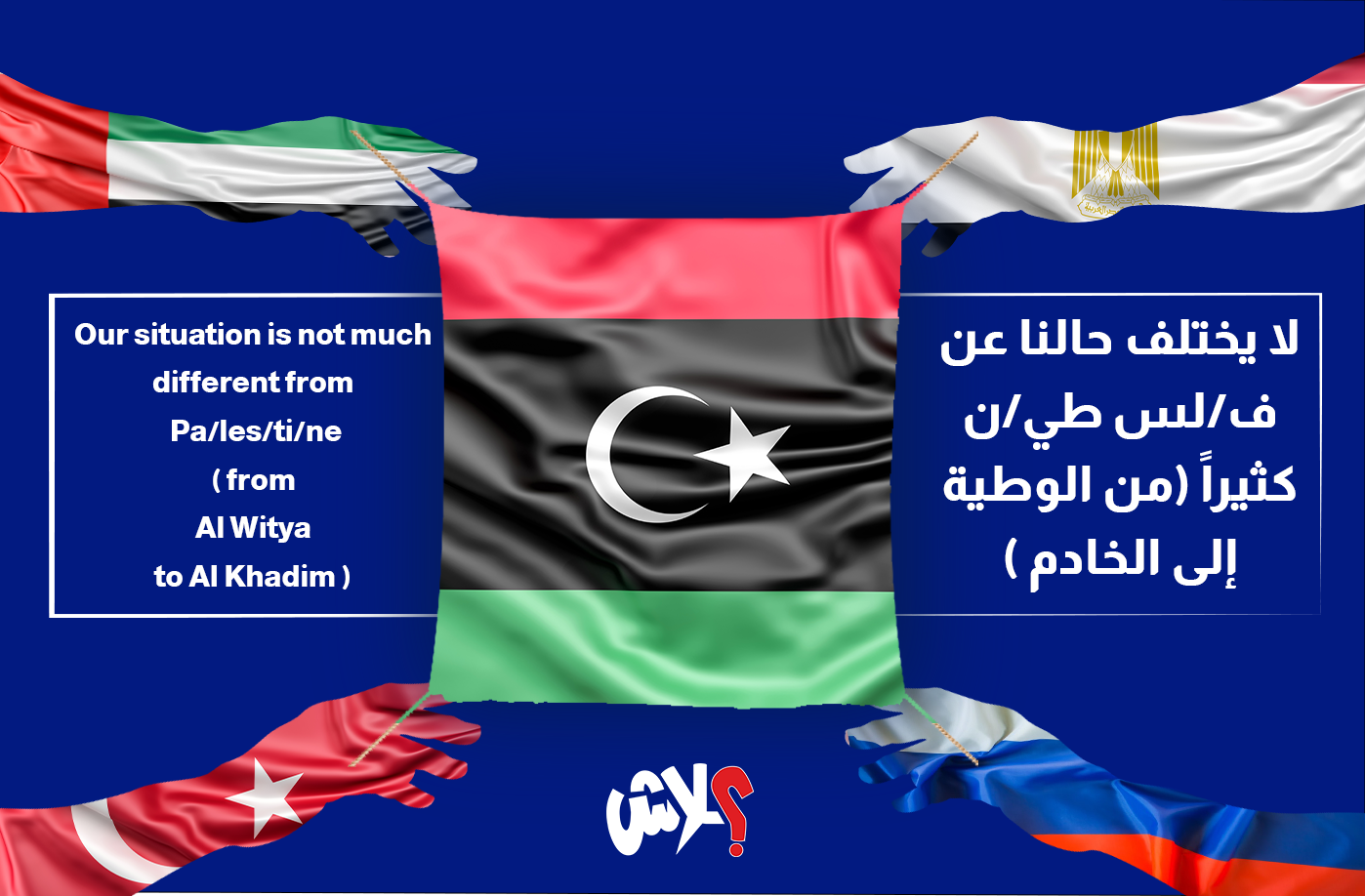Our situation is not much different from Palestine (from Al Witya to Al Khadim)
Libya has attracted every colonizer roaming the Mediterranean; no one on the face of the planet disagrees with you about the importance of Libya geographically, and its vast area that connects the African Sphere to the Middle Eastern Sphere to the European Sphere, and when the Libyan people decided to take a historic step in an attempt based on desperation to find a peaceful solution to change a system that the planet unanimously agreed is backward, and because there is not, in fact, or figuratively, any legal link regulating the process of governance and how it is transferred, the Libyans have reached a state of political instability. This situation has ipso facto opened the mouths of foreign powers seeking to assert their influence in the region. This, in turn, has had a negative impact, as it always does, on the ability of Libyans to make their political decisions freely, and we believe that understanding the presence and impact of these military bases is crucial to understanding the dynamics that shape the security landscape in Libya.
Turkish military presence (the new old occupier)
One of the most salient foreign military bases in Libya is the Turkish military base located in Al Witya. Established in 2020, this base serves as a strategic foothold for Turkey in support of the (former) internationally recognized Government of National Accord. Its presence has provided significant support to the military operations of Government of National Accord, including training, provision of equipment and direct military intervention, especially in the period of war waged by (Arrajma General Khalifa Haftar) on Tripoli in order to control it; the Turkish military base played a pivotal role in shaping the balance of power on the ground, and affected the stability of Libya by strengthening the position of Government of National Accord at the time, as well as every government that controls decision-making in Tripoli in the West all the way to interfering in the selection, nomination, and rejection of those running for the position of prime minister, not to mention the military presence at Mitiga base, and the Turks air control over the western region of Libya, specifically drones.
Russian military presence (Libya's new old ally)
Russia's military intervention in Libya revolves primarily around the Wagner Group, a private military company with close ties to the Russian government. Despite its lack of a formal military base, the Wagner Group has established a significant presence in various locations, including Sirte and Jufra, so that the central region of Libya is now effectively under Russian control, such that no military forces can move between east and west except in coordination with Wagner, and if Wagner refuses, all Libyan forces are within its range of fire. Russian military advisors, mercenaries and equipment have been deployed to support the Libyan National Army led by General Khalifa Haftar. The Russian presence has fueled the conflict, deepened divisions, and contributed to general instability in Libya.
Emirati and Egyptian participation (neighbors and their allies)
Although they do not maintain formal military bases in Libya, the United Arab Emirates and Egypt have provided significant military support to the Libyan National Army. The UAE, in particular, used Al Khadim Air Base in the eastern part of the country to launch air strikes and deliver military supplies, and it did not stop this support. In fact, the UAE still has the highest say over Al Khadim Military Base, and a starting point for its forces, not only in Libya, but in the entire region, in the manner it deems fit to serve its interests. Egypt has also reportedly deployed its air forces to support the operations of the Libyan National Army. Military support from these two countries has exacerbated the conflict, prolonging instability in Libya, and it appears that (Big Sister) led by its ruling regime, which largely sponsors General Haftar’s project in the east of the country, sees in the continued presence of such project a stabilization of and strategic depth for the ruling regime in Egypt.
We believe that no nation has the right to freely undermine another nation’s right to self-determination, and that this principle is indivisible and is not shaped according to political positions, and just as these nations that exist today on Libyan lands without real legitimate support from the people struggled to obtain their full independence, Libyans have the right to struggle to restore the freedom of their political decision-making in their country and its resources. This can only be achieved through a true national project, which calls for this right, and uses all peaceful means first, and non-peaceful means if needed, so that such project can restore its land and its decision- making.
We have a long history in this field. We are the ones who gave half of our people to reclaim their land from fascism, so all we need to do is remember...

